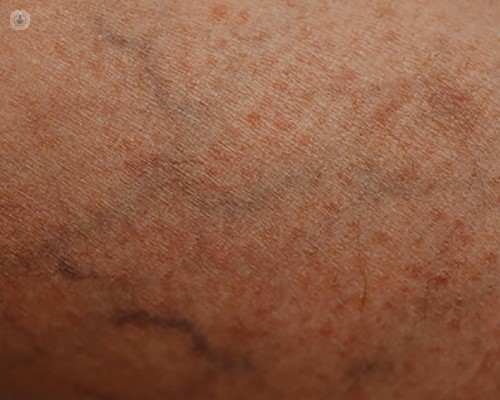Varicose and thread veins: Causes, symptoms, and treatments
Written in association with:Varicose veins and thread veins are common conditions that affect many people. Varicose veins are enlarged, twisted veins usually found in the legs, while thread veins, or spider veins, are smaller and often appear red or blue, typically on the face and legs. In his latest online article, Mr Michael Gaunt examines the causes, symptoms, treatments, and prevention strategies for both varicose and thread veins, helping you understand and manage these conditions better.

What are varicose veins, and how similar are they to thread veins?
Varicose veins and thread veins are common conditions that affect many people. Varicose veins are enlarged, twisted veins that are visible just under the surface of the skin, usually in the legs. Thread veins, also known as spider veins, are smaller than varicose veins and are often red or blue in colour. They can both appear anywhere on the body but are most commonly found on the face and legs.
What causes varicose and thread veins?
Varicose veins and thread veins are caused by a variety of factors, including age, genetics, pregnancy, obesity, and prolonged standing or sitting. They occur when the valves in the veins that prevent blood from flowing backwards become weak or damaged, causing blood to pool in the veins and leading to their enlargement.
What are the symptoms of varicose and thread veins?
Varicose veins and thread veins can cause a range of symptoms, including pain, swelling, itching, and aching in the legs. They can also cause skin changes such as discoloration or ulceration. In certain instances, they might not produce any symptoms.
How are they both treated?
Treatment for varicose veins and thread veins depends on the severity of the condition. Mild cases may be treated with compression stockings or lifestyle changes such as exercise and weight loss. More severe cases may require medical treatment such as sclerotherapy or laser therapy. In some instances, surgery might be required to remove the affected veins.
How can varicose veins and thread veins be prevented?
There are several steps you can take to prevent varicose veins and thread veins from developing. These include maintaining a healthy weight, exercising regularly, avoiding prolonged periods of standing or sitting, wearing compression stockings, and elevating your legs whenever possible.
Mr Michael Gaunt is an esteemed consultant vascular surgeon. You can schedule an appointment with Mr Gaunt on his Top Doctors profile.


